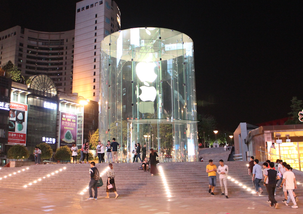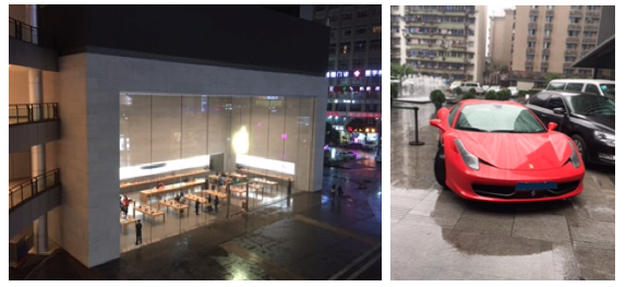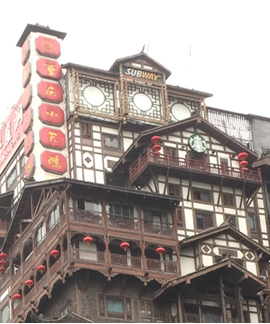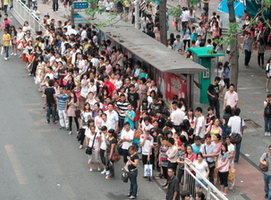Apple and Starbucks in Chongqing, China: Price-Sensitive Inland Consumers (1)
April 16, 2015
Akira Kondo
 Apple Store at Jiefangbei, Chongqing Apple Store at Jiefangbei, Chongqing
Chongqing, one of four central government-controlled municipalities in China, is located about 900 miles west of Shanghai and it is the mid-point of the 6,300 kilometer-long Yangtze River, which flows eastward all the way to the another municipality, Shanghai. The city is very populous with nearly 30 million people and its per capita GDP hits above 42,000RMB while Shanghai, for instance, has the population of 24 million and its GDP per capita more than twice higher at 90,000RMB. Despite Chongqing’s mid-income-leveled per capita GDP, which is inline with a nation-wide average, there are three Apple Stores and 12 Starbucks stores available to reach 30 million residents in the city as well as outsiders.
Apple Stores in Chongqing
It was quite a surprise that a richer Hangzhou just welcomed the first Apple Store in the province this January (the second Apple Store in Zhejiang province will open in Hangzhou April 24, the day Apple Watch goes on sale) while three Apple Stores had already been settled in Chongqing before (Please visit: “Apple Store in Hangzhou China: Popularity of Apple Products in China”). During my trip to Chongqing followed by the nearby Chengdu in the earlier April, I had a chance to visit two of the three Apple Stores in the city and as always, the stores were nicely crowded. Popularity of Apple products seems to reach well into the inner city, like Chongqing, where none of U.S. as well as European air carriers lands this mountainous area. On the Chongqing Metro, known as CRT (Chongqing Rail Transit), I was easily able to find many gold-colored iPhone 6 Plus users, like in Shanghai. However, less-expensive non-iPhone smartphones seemed much popular here. In the meantime, it is highly understandable that there are more non-iPhone users here because getting a popular gold iPhone 6 Plus simply requires about two months of their salaries while nation-wide average per capita GDP Chongqing consumers earn much less than richer Shanghai people do. Yet, it is an average-basis and there are always tens of thousands of rich people living in this neighborhood to inflate per capita GDP from millions of those who live less than the average. Or if not, China’s statistical data are just untrustworthy. Like Shanghai, it is quite common to see Ferraris or Porsches in the downtowns of Chongqing or even at the hotel parking lot of Double Tree Hilton by Hilton, where I stayed a night. This city is probably well known as Bo Xilai’s scandal in past years. Bo Xilai, the former Communist Party of chief in Chongqing, was accused of interfering with corruption case and abuse of power while his son was quickly on the global news followed by the event he drove a Porsche and continuously collected traffic citations when he enjoyed a Harvard student life. In China, it is common to see such wealthy people, who illegally inherited financial assets from parents as well as governments, and they tend to spend for any luxurious goods available in markets. Whenever you meet an extraordinary rich Chinese, who buys a multi-million dollar worth house or drives a Ferrari in the United States or Canada, and those who continuously say they are formally investment bankers, they are probably “foxes,” simply meaning “corrupt officials.” The Chinese President, Xi Jinping, has launched a “fox hunt” program for the corrupt officials, who fled to overseas with huge amount of financial assets from China, and tried to bring them back home to justice, like Bo’s family case.
Back to Apple Store story, still, the stores are very popular in this vast neighborhood. It seems iPhone consumers are relatively limited compared to the wealthy city, like Shanghai, but the modernity of Apple products nicely attract a large number of Chongqing consumers into the stores. However, there are thousands of non-iPhone sellers existing in this neighbor. Xiaomi, the fast growing Chinese-made smartphone maker, as well as conventional Samsung and HTC circle any price-sensitive consumers away from expensive iPhones. It is probably the good reason that the company offers three Apple Stores in this widespread city to keep consumers eyeing on its cutting-edge products for the long run.
<Next Page> |
Related ArticlesApple Store in Hangzhou, China: Popularity of Apple Products in China & Apple's Second Quarter Earnings Preview Apple's Dividend Growth & Power of Compounding Next PageMore about China
Starbucks in Changsha, China: Growing Upper Middle-Income Consumers Chinese ADRs: Is It Good to Buy Alibaba Shares? What is the Middle-Income Trap? The Evidence of the Middle-Income Trap |




